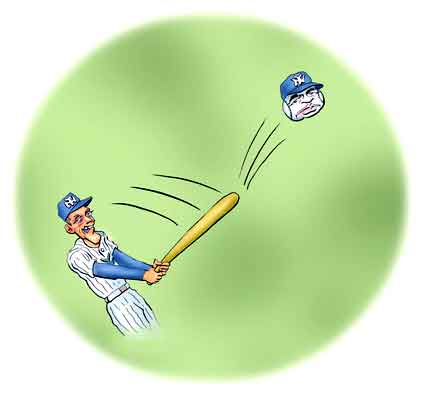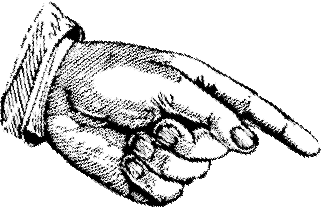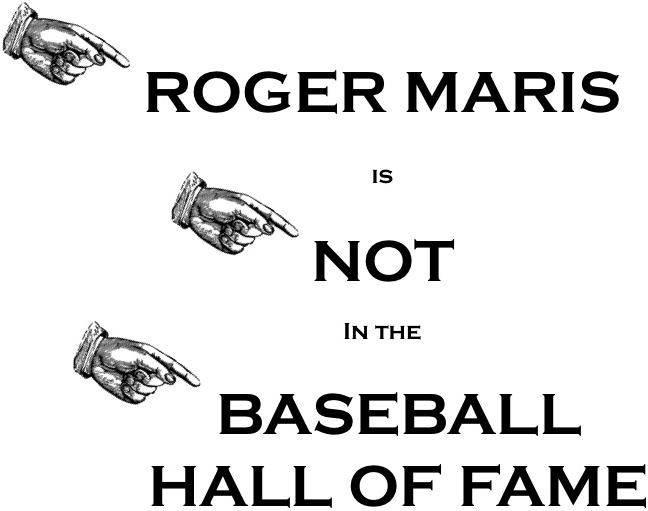Roger Maris

(Click to Zoom In and Out)
Prepare to be shocked! shocked!
Although it is impossible for an


... to believe it, but the indisputable, absolute, and verifiable
 TRUTH
TRUTH
... is that

Ha? (To quote Shakespeare.) Did you say Roger Maris is NOT in the Baseball Hall of fame?
Yes, we said

Why, we ask, has this travesty been permitted? Or rather, what particular circumstances have led to this oversight to honor the player who beat Babe Ruth's record for home runs in a single season?
We'd really like to know how that happened.
I thought you would as Captain Mephisto said to Sidney Brand. It's very simple really.
But perhaps first we should quote a contemporary newspaper of September 28, 1961.
We might as well get into the controversy about the 59th home run hit by Roger Maris. We don't hesitate to say that we are glad Maris didn't tie or beat Babe Ruth's 34-year old home run record. We agree with Commissioner Ford Frick that any batter must do it in 154 games. There's no if's or but's.
You see, in 1961, the very year that Roger hit 61 home runs - Babe's record for a season was 60 in 1927 - the number of games per season had been increased. The rationale, although goobering up comparison of past and future records, had some basis in logic. Before then both the American League and the National League had eight ball teams. They played each other a total of 22 games each - 11 at home and 11 away. So with each team playing 7 opponents 22 times, we see that made a total of 154 games for each team.
But in 1961 the American League added an extra two teams - the Minnesota Twins and the California Angels1. So now you had 10 teams. That would have each team playing each opponent a total of nine times. With 22 games each that would have ended up as a whopping 198 games in the season.
Footnote
The actual 1961 expansion is a bit confusing and you can say that the real expansion team was the Washington Senators even though there was already a team called the Washington Senators. You see, the Washington Senators - established in 1901 - decided to move to Minnesota for the 1961 season and thought that a name change was in order. So they became the Minnesota Twins after the "Twin Cities" of Minneapolis and St. Paul. Then another team was formed in Washington and took the old name. But this team finally decided to move in 1971 to Texas and became the Texas Rangers. The void in Washington wasn't filled until 2002 when the Montreal Expos moved to Washington and took the Nationals name.
Washington's professional baseball teams - there's been eight of them more or less - have used the name "Nationals" and "Senators" for more than a hundred years. But lest the reader become wearied by further explanation, this topic will be deferred.
That, the Baseball Powers That Be decided was too much. But you couldn't have a 154 game season. The closest you could get was 144 (with 16 games played with each opponent - 8 at home and 8 away). But cutting the season back would have irritated the fans. So you had to go with 18 games per opponent or 162 games.
But the expanded season now gave Roger an extra eight games to hit 61 homers. And Roger's teammate and friend, Mickey Charles Mantle, was also in the running to beat the Babe's record. In fact, Mickey was expected to beat the Babe first but then he was injured, and that left Roger in the running by himself.
But then stepped in Major League Baseball Commissioner, Ford Frick2. The oft-told story is that he said if you included Roger's record in a book, you had to include Babe's record as well. And you'd put an asterisk by Roger's entry pointing out it was for 162 games, not 154 games as it was in Babe's record breaking season.
Footnote
Why baseball commissioners have such funny names - Kenesaw Mountain Landis, Happy Chandler, Branch Rickey, Bowie Kuhn - remains a mystery.
Actually the ruling was a bit harsher. Unless Roger beat the record by the 154th game, Ford said, his record just wouldn't count. And so Babe would still hold the records. But knowing that record books were compiled independently of the Major League Organization, Ford made it clear that any book listing Rogers' should asterisk his record.
What, we ask, made Ford so touchy about Babe's record? Well, Ford, we must point out, had been a friend of the Babe's. He had also been increasingly irritated the way new players were given advantages - livelier balls, better made bats, and smaller baseball parks. Ford felt that if someone was going to best the Babe, it had to be all the way or not at all.
By the 154th game Roger had slammed in 58 homers. He hit one in that game but that left him one behind the Babe and two behind the record. It wasn't until the 158th game that Roger hit number 60.
For the next three games Roger hit a dry spell. By October 1, 1961, for the 162th game - the last game of the season - Roger had yet to hit another homer. So it looked like the Babe's record would indeed stand - no if-ands-or-buts.
In Roger's first time up, he popped a fly to left field. He was out. Then at his second at-bat he let the first two pitches go by. The third pitch, though, - a fastball - Roger smacked into the bleachers.
The crowd went crazy. A kid got onto the field and stood on the third base line waiting for Roger. As Roger rounded the bases, they shook hands.
From then on if you asked Joe or Josephine Blow on the street who had the most home runs in major league baseball, they'd say Roger Maris. Roger even met President John F. Kennedy at the White House and what was even a greater honor, Roger's wife, even appeared as a contestant on the panel-quiz program To Tell the Truth.
What surprises readers who read about Roger is that his last name was NOT Maris. Instead he was born Roger Eugene Maras on September 10, 1934, in Hibbing, Minnesota, but the family moved to North Dakota when Roger was three. He attended the Bishop Shanley High School in Fargo and graduated in 1952. The next year he began playing in the minor leagues and in 1956 was called up to the majors. He played first for the Cleveland Indians, was traded to the Kansas City Athletics in 1958. Then in 1960 he was sent to the New York Yankees.
The story of the name change varies a bit with the telling. Some sources say the change was made by Roger's dad. Other sources say it was Roger's idea and was because the last syllable made for taunting puns of the type common among immature children, teenagers, stand-up comedians, politicians, and nationally elected officials.
However, the whole family - parents Rudy and Anne Corinne (called Connie by her friends) and brother Rudy - assumed the Maris moniker and there is some reason to think that this collective action was in part due to difficulties between the branches of the extended Maras family. The adoption of the new name was a bit of a nose tweak to the other Maras branches who to their irritation found that they were now somewhat distanced from the new Home Run King.
Roger was traded to the St. Louis Cardinals in 1967. He retired in 1968 after twelve years in the major leagues. He made about $600,000 over his entire major league career which translates to about $5 million today. Pretty paltry particularly when you consider that in those pre-tax-cuts-for-the-rich days, there was still a 90% tax bracket. So like most retired professional athletes of the time he went into another line of work. In his case, it was the beer distribution business, and Roger died in 1985 in Houston.
As far as Roger's 61 home-run record, Eventually reason prevailed although it wasn't until 1991 - six years after Roger died at the early age of 51 - that Major League Baseball finally decided that, yes, Roger did hold the season record for homers. So although Roger's record retroactively stood for 37 years - it was only acknowledged for seven years and then Sammy Sousa and Mark McGwire hit 66 and 70 home runs in the 1998 - and in a 162 game - season.
But it seems that Ford's pronouncement still rules in practice. To date when the Judges of the Hall have looked at Roger's record - a paltry .260 batting average, a lowly 275 home runs, a mere 1325 hits, and a pedestrian 850 runs batted in, they peer down their collective noses and say, "Roger? In the Hall of Fame? Not [as Eliza Doolittle said], bloody likely."
On the other hand, Roger's fans point out that he won the Gold Glove Award for American League Outfielders in 1960, was the Sporting News Player of the Year in 1960 and 1961 as well as being honored as the Sporting News Major League Player of the Year also in 1960. He also won the Hickock Belt, the Associated Press Athlete of the Year, and the Most Valuable Player Award, all in 1961. And he was in three World Series and was on the All-Star Team for seven years!
And, for crying out loud, he DID hit the 61 homers in one season.
Harrumph.
References
.Roger Maris - A Man for All Seasons, Maury Allen, Dutton, 1986.
Roger Maris: Baseball's Reluctant Hero, Tom Clavin, Atria, 2009.
"Humble Hometown Hero", Roger Maris Museum, Fargo, North Dakota.
"The Sports Corner", [George] "Rockabye" Ross, About [Phoenix] Arizona Sun, September 28, 1961, Page 4.
"Why 162 Games?", Jim Weathersby, The Sports Historian, April 21, 2017.
"Roger Maris", Baseball Reference.
"Roger Maris Awards", Baseball Almanac.
The Official History of Baseball, Video, Major League Baseball Productions, 1998.